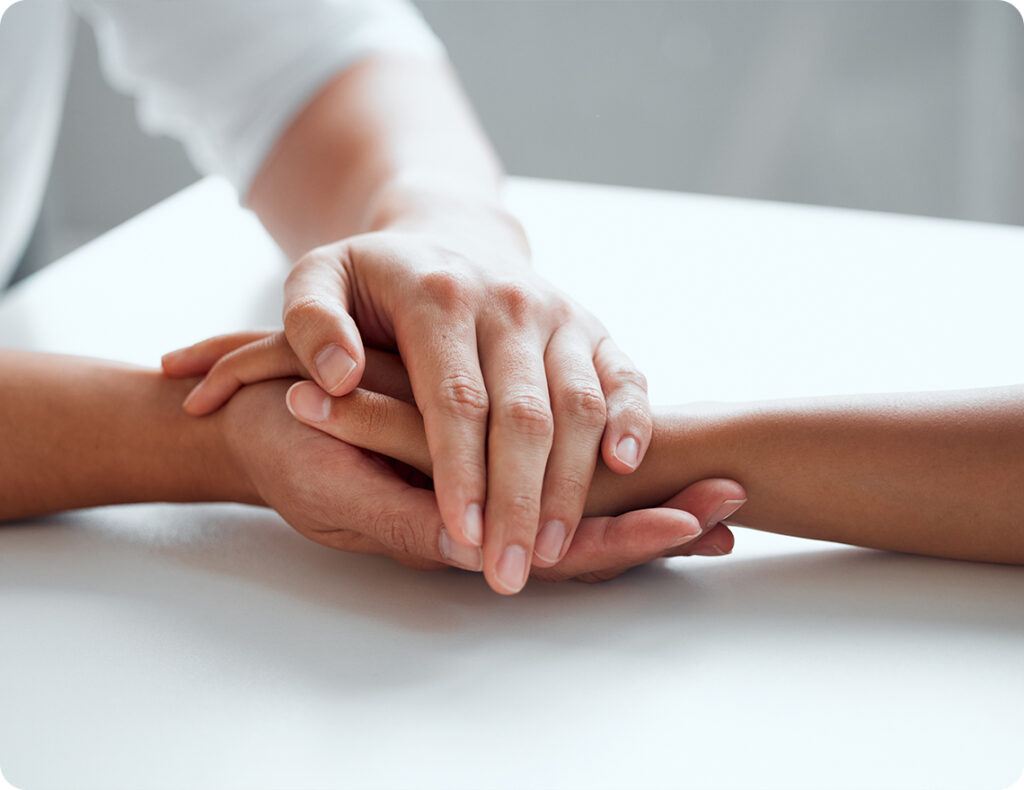Steps into a
non-violent living
Every woman has the right to a life free from violence. We inform you about offers of help and possibilities to find ways out of violence. If you would like to help or get involved against violence, you will also find materials and suggestions here.

Emergency contacts
Recognising & reacting to violence
The international aid symbol
Step 1:
Show open palm
Step 2:
Put your thumb in your hand
Step 3:
Close your hand into a fist
Forms of violence
Pain or injuries are inflicted on them deliberately and repeatedly. Hitting, pushing, choking or holding are clear signs. Threats of physical violence are also included. It often starts with an initial push, kick or grab - and gets worse over time.
What is domestic violence?
Find out more in the video.
How can I help if I suspect domestic violence?
Recognise signs
A woman does not always recognise violence immediately or talk about it. Domestic violence is often difficult to recognise as it is not always loud or obvious. Possible signs are visible injuries, changes in behaviour, a withdrawal from the social environment or indications of emotional or financial dependence. In such cases, I pay more attention to these signs.
Addressing concerns
It can be difficult to talk about violence. But an open conversation is an important first step and can prevent worse things from happening. If someone seems frightened or withdrawn, I speak to them gently. I listen without exerting pressure. Counselling centres and professionals offer support and help to show ways out of violence.
Providing security and trust
I create a calm and safe atmosphere so that the person can open up. They should feel that I believe them. I take their concerns seriously without interrupting or judging them. I avoid critical questions such as "Why don't you just leave?" because they put the person under pressure. Instead, I give her time and encourage her. She deserves support. It helps to tell her often: "You're not alone. There are ways out of violence."
Point out offers of help
Specialist centres in Lower Austria help with psychosocial counselling, legal information and support in acute emergencies. I inform her about anonymous and free support services. What she says there remains confidential. Help is available at every stage - whether she is unsure, wants to talk or is looking for a way out. The specialist centres also offer support later, when she is building a new, secure life. Counselling can take place in person, over the phone or by video - whichever suits her best.
Stay patient and provide support
Every woman decides for herself when she wants to change something. I respect her pace and her decisions. Even if I want her to act quickly, I give her the time she needs. Violence often causes fear and insecurity. That's why it sometimes takes time for someone to accept help. It's important that I show them: I am there for them. Even small gestures or a supportive word can often be a great help.
You can find more information and tips for civil courage against domestic violence here:
Help & advice in Lower Austria
Women's counselling
Women's counselling centres offer free, anonymous and confidential help, including in cases of domestic violence. The counsellors are bound by confidentiality and provide support with psychosocial, social and legal issues. Counselling is often available in several languages. Many counselling centres are only accessible to women and offer a protected space. Women affected by violence can find support here in order to find new paths and exercise their rights.
Contact information:
Women's shelter
Women's shelters offer women and their children protection when their home is no longer safe. Admission is possible at any time. Here, women who experience violence find accommodation, safety and support for an independent life. They receive counselling on legal, social and financial issues as well as help with finding a job and accommodation. Psychological stress is also taken care of. The first few weeks are free of charge, after which there may be a charge. All discussions remain confidential, but completely anonymous accommodation is not possible due to public funding.
Contact information:
Violence Protection Centre
Violence protection centres can be found throughout Austria. They help women to protect their rights. If the police remove a violent person from their home, the centre is informed and offers immediate support. However, women can also report themselves. The centres help to extend bans on entering or approaching, advise on protective measures and accompany women in criminal proceedings against the violent person. They offer legal and psychological support.
Contact information:
Healthcare
There are specially trained victim protection groups in Lower Austrian clinics that help victims of violence. These specialists also secure forensic evidence and keep it for six months. It can also be important for legal action against the perpetrator at a later date. All information is treated confidentially. Professionals are only obliged to report the incident if there is an acute risk to life or health. The healthcare system is often the first point of contact for women who experience domestic violence. Doctors, nurses and therapists provide support with physical and psychological consequences.